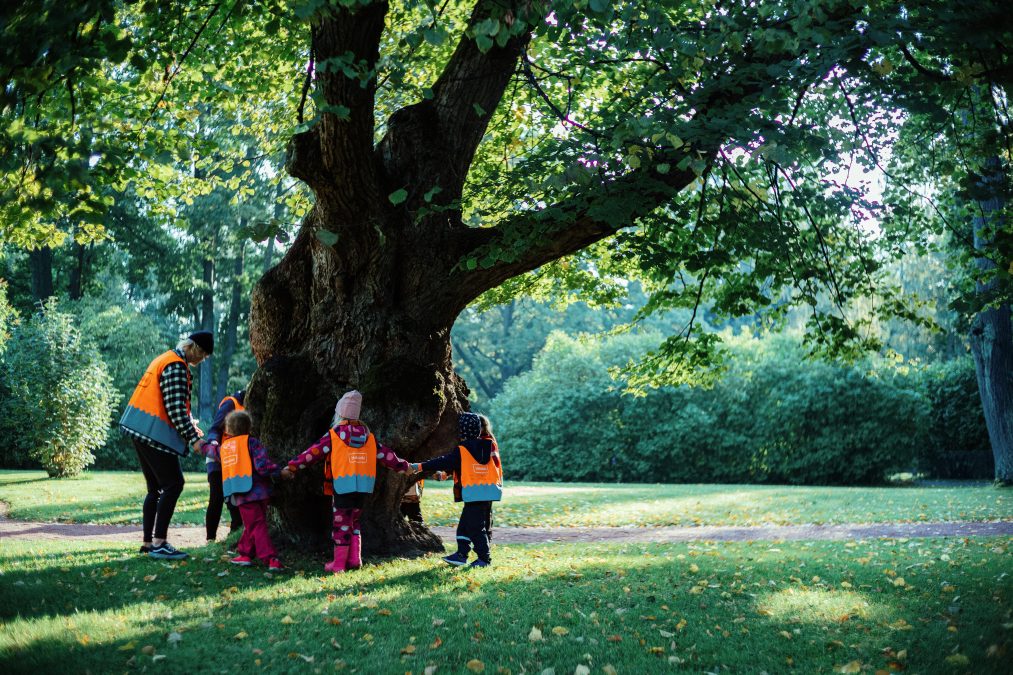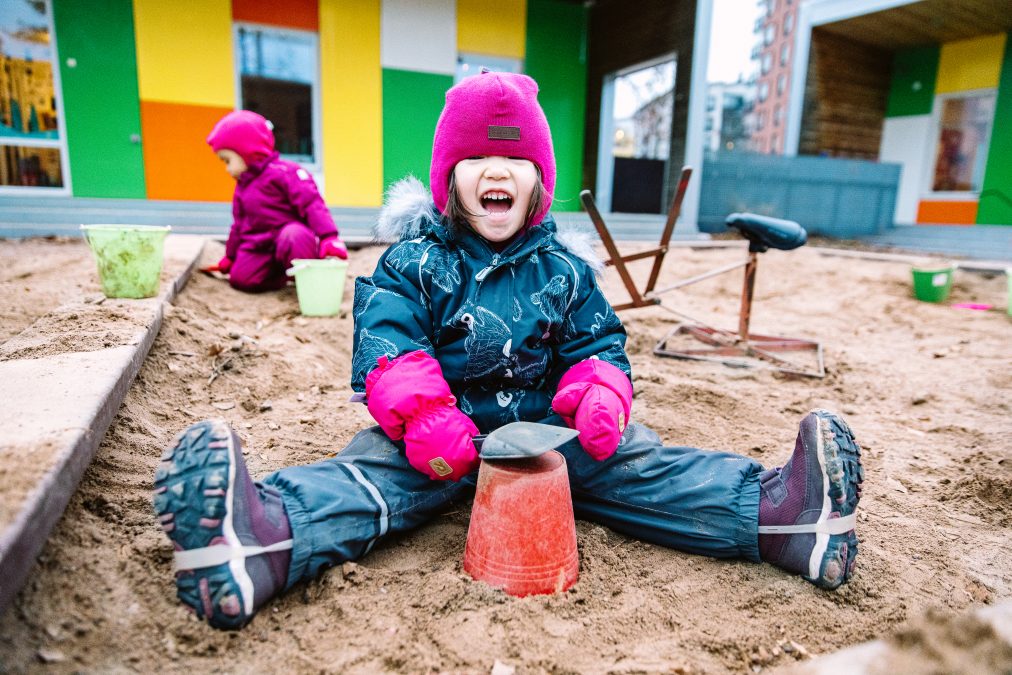Daycare in Helsinki
On this page
- Early childhood education
- Services for international families
- Daycare centre admission and fees
- Other childcare options
- Pre-primary education (Age 6)

Daycare in Helsinki is very good and affordable
This is because the city has made early childhood education a priority. Almost every child in Finland attends daycare for a few years, as it is seen as beneficial for their social development.
All children have the right to attend daycare in Helsinki. The employment status or income of their parents or guardians does not affect this. In Finnish society, early childhood education is valued as a necessary step to prepare children for school and everyday life. For an illustration of how early childhood education and care fits into Finland’s overall education system, see our School journey timeline.
Helsinki has many public and private daycare centre options from which families can choose. Each daycare centre in the city follows the same pedagogical principles and the staff are always qualified professionals. In addition, public daycare centres are located in every neighbourhood of the city, within walking distance of most homes.
Is Finnish daycare like a nursery or preschool?
Yes, it is! Other cultures may call it childcare, a nursery, playschool, preschool or kindergarten. In Helsinki, it is part of a larger educational component called early childhood education. To learn more about what exactly this means, read this great Guide to early childhood education and care put together by the city.
Early childhood education
Early childhood education in Finland emphasises learning by playing. Developing social skills is equally important. A typical day in a Helsinki daycare centre (päiväkoti) includes plenty of playtime and outdoor activities. Children in Helsinki’s municipal daycare centres receive a daily breakfast, warm lunch and afternoon snack as part of the service. In addition, younger children normally take a short nap in the afternoon.
Children starting in a new public daycare centre usually have an introductory period in which their parents or guardians can accompany them as they get to know the new routine. Parents or guardians can use this opportunity to see for themselves how things work and ask questions.
All early childhood education institutions follow the national core curriculum for early childhood education and care. Moreover, Helsinki has its own early childhood education curriculum that takes the increasing diversity of the city into account. In addition, daycare staff and the parents or guardians draw up a personalised early education plan for every child. This plan is reviewed regularly.
Most children in Helsinki attend early childhood education in Finnish, Swedish or North Sámi. North Sámi is the most common language spoken by the indigenous Sámi people of Finland. Several public and private daycare centres offer early childhood education in different languages such as English, Spanish, French, German, Russian and Estonian.
Several of the city’s daycare centres offer evening or round-the-clock care. This care is therefore ideal for parents and guardians who work in the evenings or do shift work.
Services for international families
Some municipal daycare centres employ early childhood education multilingual counsellors who offer guidance in multiple languages for international children and their families. These counsellors help children adjust to daycare and foster communication between the centres and families.
There are also several private daycare centres that provide childcare in languages other than Finnish and Swedish. At present, daycare services are available in Helsinki in English, Russian, German, French, Spanish and Arabic. See this list of early childhood education in other languages for more information.
Are you debating between a Finnish-language, Swedish-language or English-language daycare?
We encourage you to trust in your child’s ability to learn new languages quickly. If you think it would be beneficial for your child to learn Finnish or Swedish or some other tongue, do not hesitate to enter them into a daycare that offers services in that language. The City of Helsinki has many forms of support to get the children off on the right foot and you will be surprised how easily they pick up new skills.

What supplies does my child need?
Children should have appropriate clothing for long periods of outdoor play in all kinds of weather. Ask your daycare centre staff for a list of the items required.
Daycare centre admission and fees
Registered residents of Helsinki can apply for municipal daycare any time after their child is born. Service guidance is available in English to guide you through the process. However, this must be done at least four months before you plan to use the service. Most children in Helsinki start some kind of daycare or playgroup by the age of three.
If the municipal daycare location closest to you is full, the city will try to find an alternative centre nearby. The city offers temporary daycare, if your situation is urgent.
Public daycare is very affordable in Finland, and low-income families may not have to pay for the service at all. Daycare fees are dependent on the family’s income, size and the number of weekly care hours. Use the city’s daycare fee calculator to get an idea of the cost. Children can attend daycare on a full-time or part-time basis. The city grants a discount to siblings in the same facility.
Other childcare options
Applications to private daycare centres in Helsinki are submitted directly to the daycare centres. Instructions are available on the individual websites.
Private daycare centres tend to ask a higher monthly fee than public centres. Nevertheless, several subsidies are available to cover these costs. The state benefits agency Kela grants a private daycare allowance to families that opt for such services. Also, the city supplements full-time private daycare costs.
There are several other early childhood education options in Helsinki, beyond daycare centres. Examples include family daycare, group family daycare and hiring a nanny. In family daycare, trained care providers look after children in the children’s home, while in group family daycare, the care takes place in municipal or private facilities.
Playgroups are an alternative to municipal daycare for parents or guardians who are taking care of children aged two to five at home. They offer 2.5-3 hours a day of social interaction with other children several days a week. Most municipal playgroups take place in local daycare centres or playgrounds, with some private groups in churches and other facilities. In general, playgroup schedules follow the academic year, with breaks for schools holidays and the summer. And don’t forget that playgrounds, family houses and other play areas in the city offer a wide range of fun activities for the whole family.
Tänään tavataan clubs offers free Finnish lessons at playgrounds for parents of children under 10 months of age, while the Helsinki Vocational College offers KOTIVA groups, where parents of 10 month to 3-year-old children can learn Finnish while their children play.
Pre-primary education (age 6)
Compulsory pre-primary education (esiopetus or, more familiarly, eskari) is roughly equivalent to US kindergarten or UK reception and starts at age six in Finland. Children attend eskari at a daycare centre or primary school.
A day in eskari consists of four hours of instruction, after which most of the children remain in daycare for the afternoon. Eskari is free of charge. However, if the children stay in the facilities for the afternoon, parents or guardians are required to pay a fee. The curriculum of pre-primary education focuses on preparing the children to start their journey in primary school. There are specific learning goals for the year, but no formal assessments.
If your child starts pre-primary education without Finnish or Swedish language skills, the city provides what is known as preparatory education to help the child learn the language. This instruction is available several hours a week at no cost.